Asinelli Tower: your privileged view over Bologna
Asinelli Tower : the tickets most chosen by travelers
Bologna City Center: Guided Walking Tour
Enjoy a walking tour through the streets of Bologna visiting its attractions
from 25 €

The Asinelli Tower in Bologna: climb the highest point and enjoy the view
Bologna is a lively, dynamic, and welcoming city, a true magnet for young people, tourists, and students from all over the world. It’s famous for its culinary delights, prestigious university, numerous events, and vibrant nightlife. Moreover, its unique structure makes it good for interesting cultural tours. Dominating the city are the famous Two Towers, the Garisenda and, of course, the Asinelli, the taller of the two, probably built between 1109 and 1119.
The Asinelli Tower is undoubtedly the symbol of Bologna. With its 97 meters and 498 steps, climbing to the top is quite the challenge, but its breathtaking view on the top makes the effort worthwhile: a 360-degree skyline of the city that you won’t resist photographing. That’s why, during your visit to Bologna, you can’t miss the chance to climb it.
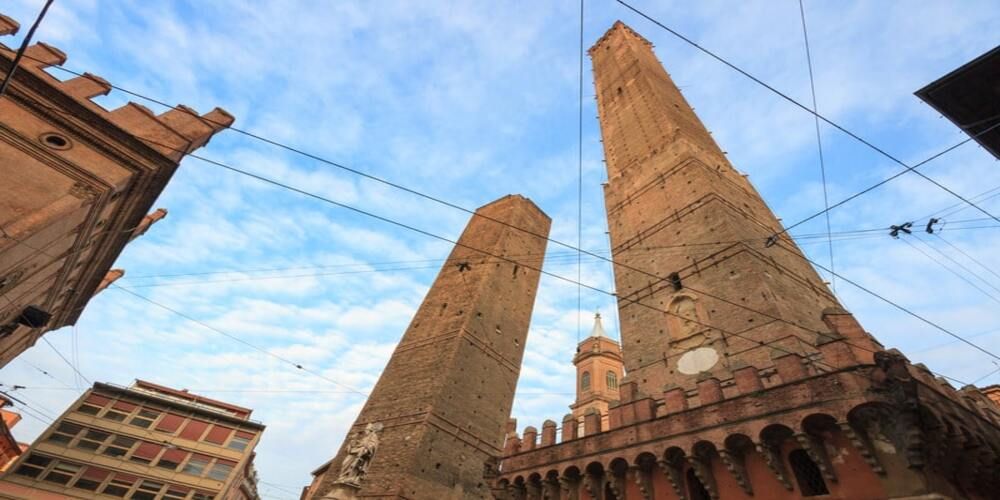
Discover all other experiences
Useful information for visiting the Asinelli Tower
Opening hours:
Winter period
Until January 8: 10:00 AM – 5:15 PM (last entry)
January 9 – March 2 and November 6 – December 31: 10:00 AM – 4:30 PM (last entry)
Spring/Autumn period
March 3 – March 31 and October 2 – November 5: 10:00 AM – 6:00 PM (last entry)
Summer period
April 1 – October 1: 10:00 AM – 7:00 PM (last entry)
June 1 – October 1 (Thursday–Sunday): 10:00 AM – 8:15 PM (last entry)
Tickets:
Full: €5.00
Reduced: €3.00 (children 4–11 years, over 65, school groups, university students, Card Cultura holders)
Free: Bologna Welcome Card EASY and PLUS holders; children 0–3; authorized tour guides; disabled visitors and their companions
Free ticket reservations for disabled visitors and their companions must be made by emailing booking@bolognawelcome.it or visiting the Bologna Welcome info point in Piazza Maggiore.
Entrance is in Piazza di Porta Ravegnana. Booking is mandatory and must be done at least 24 hours before entry. It’s advisable to arrive 5 minutes before the selected time slot. Late arrivals will not be allowed entry to the next slot, and no refunds will be issued.
Asinelli Tower : tips for your visit
How to get to the Asinelli Tower
To reach Bologna’s Two Towers, we recommend walking under the famous arcades for about 1.5 km. However, if you prefer public transportation, you can take bus numbers 25, 27, 30, and 11 from the central station and get off at Via Rizzoli, right at the foot of the structure. From the station, line A also leads to Piazza Maggiore, a few meters away. Alternatively, you can head to Piazza XX Settembre and take bus number 15 or line C, which stops at Piazza San Martino, just 500 meters from the towers.
Keep in mind that due to the closure of Via dell’Indipendenza for tram line construction, public transportation routes have been changed.
The best experiences in Bologna
Best attractions around Asinelli Tower
all entrance tickets for the most popular Italian attractions
Masone Labyrinth
BolognaClassis Museum and the Basilica of Sant'Apollinare in Classe
Emilia RomagnaMaranello Ferrari Museum
BolognaFellini Museum
Bologna10 Things to do in Bologna
Read more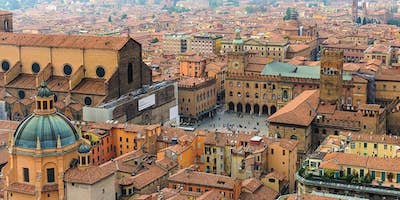
Frequently asked questions about a visit at the Asinelli Tower
How many steps are there in the tower?
The tower has 498 steps. There are no elevators, so it’s best to wear comfortable clothing and shoes and avoid carrying bulky bags or backpacks due to the limited space.
How long does the visit last?
The visit lasts approximately 45 minutes, including the climb and time to admire the view.
How tall is it?
The tower stands 97.2 meters tall and has a slight tilt, making it the tallest leaning tower in Italy – even taller than Pisa’s Tower, which is “only” 56 meters high.
Why is the Asinelli Tower closed? When will it reopen?
In October 2023, suspicious movements were detected in the foundations of the Garisenda Tower, whose tilt increased. For safety reasons, both towers have been closed to the public since then. While the reopening date remains uncertain, the repair work is reportedly progressing well.
Why is it called "Asinelli"?
The tower’s funny name (Asinelli means donkeys) lies in the legend. According to an ancient tale, a pair of donkeys found a chest full of gold and brought it to their fortunate owner, a farmer. Thanks to this unexpected wealth, the farmer’s son was able to marry his lover, a noblewoman, and he built a very tall tower to prove his love. Thanks to the gold, the young man succeeded.
Another, more plausible version suggests that the tower belonged to the family involved in construction field, and that they named the building after the donkeys in charge to carry the building materials. The simplest version attributes the name to Pietro Asinelli, the knight who commissioned the tower.
When was it built, and what did it represent?
Built between the feudal era and the rise of city-states, the tower was one of about 100 that once surrounded Bologna’s old center. It symbolized the Asinelli family’s greatness and prestige, allowing them to monitor their lands from above. In the 14th century, the tower became municipal property and was used as a prison.
Why can’t students climb it?
According to a popular belief, climbing to the top of the tower prevents students from graduating. For this reason, Bologna University students traditionally avoid it until after their graduation and they visit it to celebrate that important milestone.
Climb the Asinelli Tower: admire Bologna from above
The Asinelli Tower is located in the heart of Bologna, in Piazza di Porta Ravegnana, surrounded by Strada Maggiore, Via San Vitale, and the start of Via Zamboni, home to various university faculties. Most notably, it’s near Via Rizzoli, which, along with Via Ugo Bassi, is one of the city’s main thoroughfares – ideal for shopping and strolling. Just a few meters away is Piazza del Nettuno, featuring the famous statue of the God of the Sea, and the splendid Piazza Maggiore. In short, during your walks in the city center, you can’t help but wonder of this historic landmark.
The Asinelli Tower is included in many city tours, and privileged access is easy to obtain. However, due to ongoing maintenance work on the Garisenda Tower, the Asinelli Tower is currently closed.
Visit Bologna and its other attractions
In addition to the Asinelli Tower, Bologna boasts numerous nearby marvels. Here are just a few:
- Garisenda Tower: The “younger sister” of the Asinelli Tower, named after the Garisendi family who commissioned it to symbolize their prestige.
- Piazza del Nettuno and Piazza Maggiore: Together, they form a single wide open space and are iconic symbols of Bologna. Piazza del Nettuno is named after the statue of the Sea God and houses the city hall with its Clock Tower.
- Basilica of San Petronio: Dedicated to Bologna’s patron saint, it dominates Piazza Maggiore with its brick structure. This Gothic-style basilica is the sixth-largest church in Italy, and its steps are a popular meeting spot. Its richly adorned interiors are also worth visiting.
- Prendiparte Tower (or Coronata): Located in the city center, it’s less famous but the second tallest at 60 meters. The panoramic view from the top is stunning. Built in the 12th century, it later served as the Archiepiscopal Seminary and a prison. Today, it hosts numerous events in a breathtaking setting.



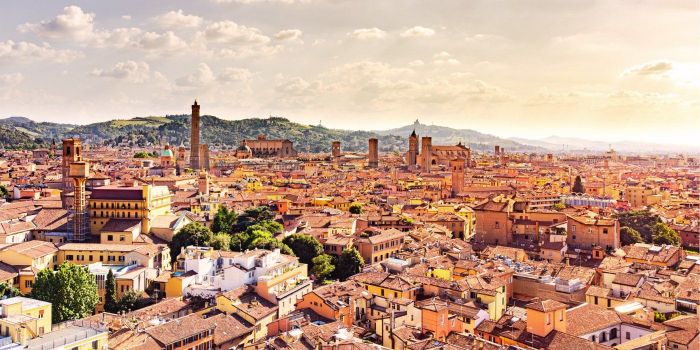
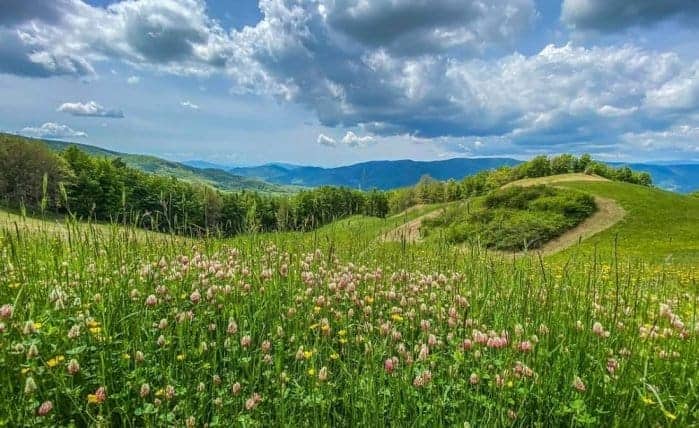
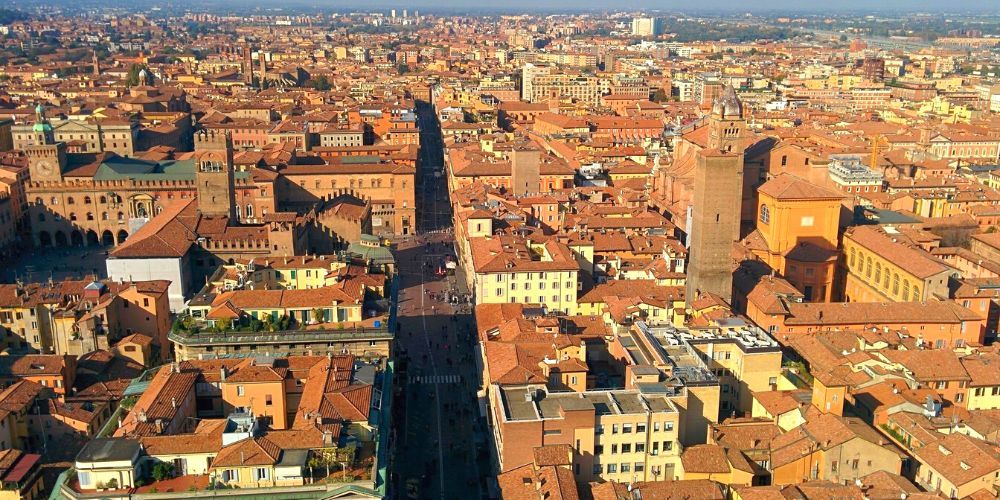
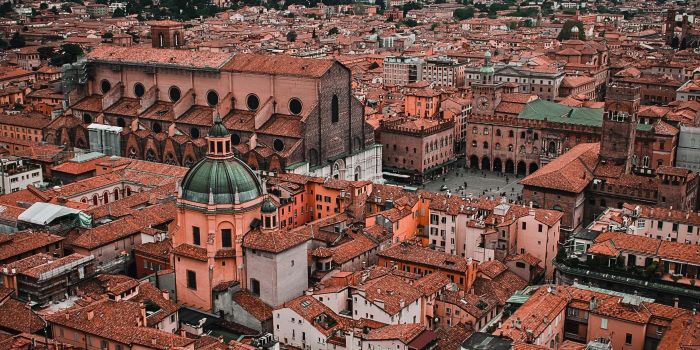
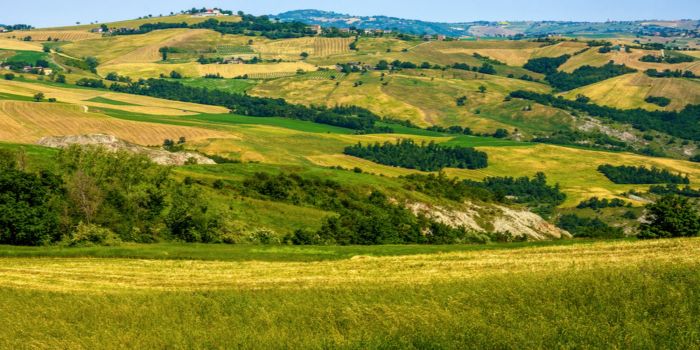
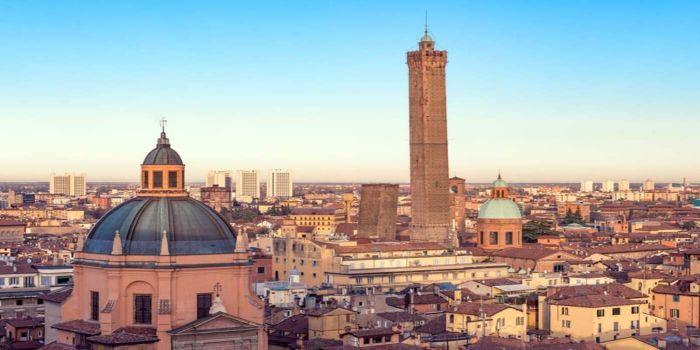
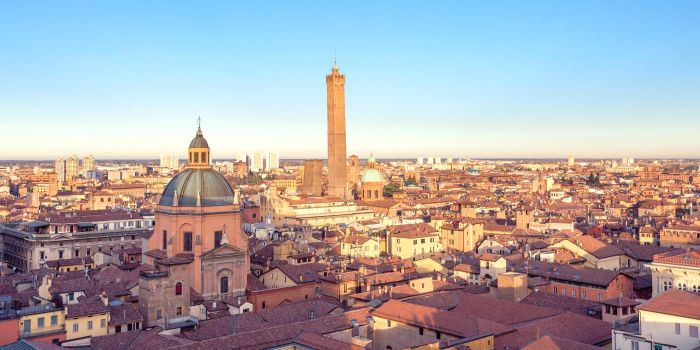
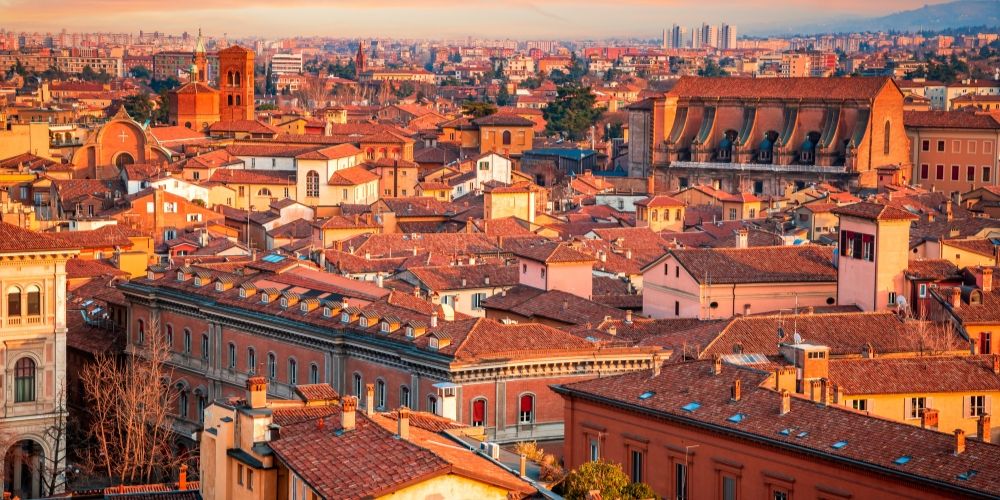
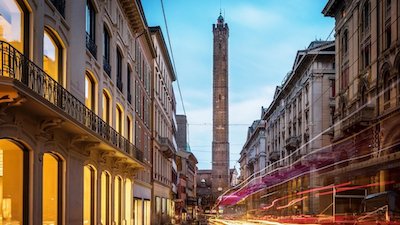








Denise Penna
Do you want to admire the city of Bologna from above? Buy a ticket for the Asinelli Tower and discover the details for a visit and some curiosities about the symbol of Bologna.